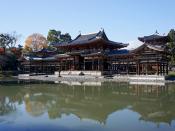Modern Japan "Modern Japan"� is a term that defines an entire history of Japan that had molded it into what it is today. Japan is known as a "modern"� artifact because it is a typical product or result made by its people in the past. The heroes of Japan's history affected its people of today and are presently followers of the same heroes. Many people believed, before modern Japan, that there would be social disruption of the same kind that was witnessed in the Western societies.
In Re-inventing Japan: Time, Space, Nation, Tessa Morris-Suzuki says that the word "Japan"� means a natural region. Japan has always been protected mainly because of the ocean around it, so there were hardly any problems having to do with people trying to migrate into their nation or other countries trying to attack their land. Tessa explains that the ocean around Japan was like its "moat,"� that it would protect itself from outside influence.
Images of nature have plated a particularly central role in molding the imagery of nationhood.
(Re-Inventing Japan: Time, Space Nation, p. 35) Over the many years of Japanese history, a few instances that had much contribution to the molding of "modern Japan,"� was the Taoist view. The Taoist belief of the future of Japan was "The destiny of humanity was thought to be fulfilled not by the acts of virtue, but by immersion within the flow of existence, the "ÃÂone'."� They believed that the relationships between people only happen if there is hope that all these people are connected in some way. This creates the environment of Japan, through time, by "immersion within the flow of existence."� This happened during the Tokugawa period. "Natural history"� is the main idea of the Japan today. In Meiji Japan, Western ideas and technology...


